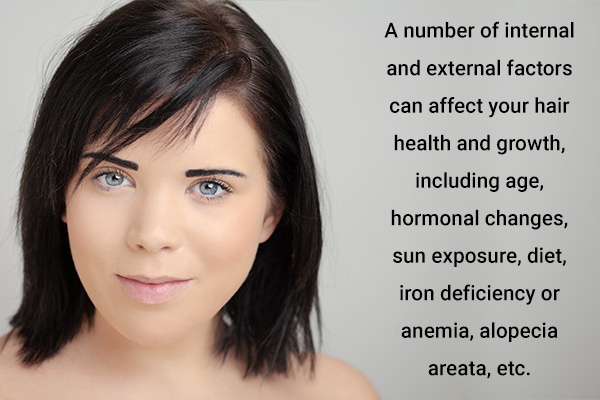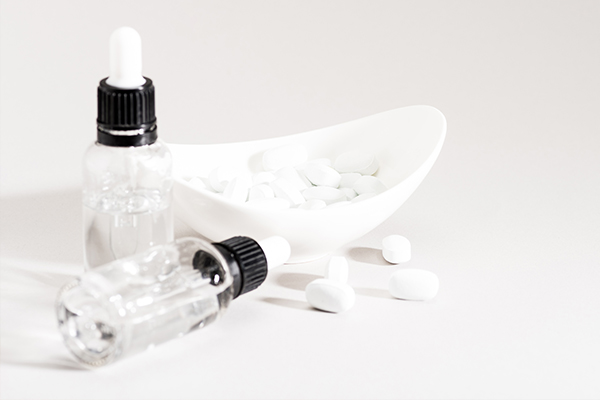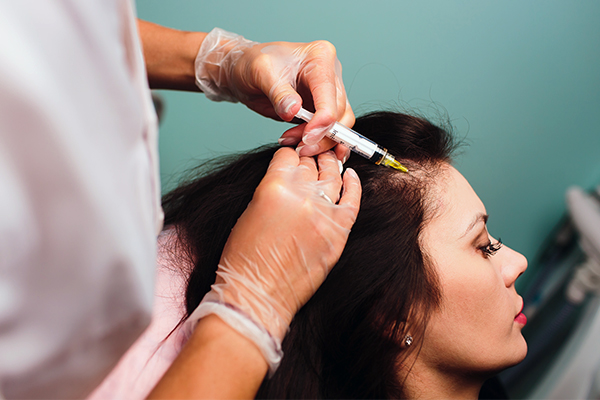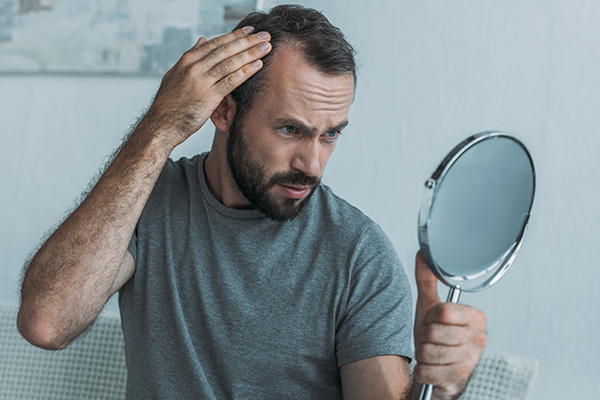In this article:
A full head of healthy hair is a common desire among people. The health of your hair not only represents good health but is also considered part of your personality. However, it is easy for your hair to get damaged with constant exposure to environmental pollutants or due to some medical conditions.

Taking simple steps to ensure the cleanliness, nourishment, and hydration of your hair can go a long way in maintaining good hair health.
Several home remedies and self-care measures can help solve hair problems such as dryness, dandruff, and hair loss and boost hair growth at the same time. However, you may need to undergo medical treatment to regain the health of your hair or treat any underlying disease.
This article talks about the different factors that can affect your hair growth and the medical treatments you can seek to address the problem.
Stages of Hair Growth
Hair grows in a cyclic pattern of three phases:
- Anagen phase: Also known as the growth stage, the anagen phase is marked by the rapid division of hair bulb cells.
- Catagen phase: In this stage, hair growth is stopped as the outer root sheath sticks to the hair root. About 3% of all hair enters this phase at once.
- Telogen phase: This final stage of the hair cycle is marked by a rest phase. In this phase, the hair rests in the root while new hair grows underneath it.
Factors Affecting Hair Growth

A number of internal and external factors can affect your hair health and growth, including:
1. Age
Hair thinning and hair loss are common factors for natural aging as the hair undergoes both macroscopic and cellular changes with age. (1)
2. Hormonal changes
Hair growth is largely affected by hormonal levels, and therefore women may experience increased hair fall before or after pregnancy and during menopause. Men may also be affected by male-pattern hair loss due to changes in their dihydrotestosterone levels combined with genetic factors.
3. Sun exposure
Constant exposure to harmful UV radiations from the sun can damage the hair, resulting in hair breakage, dryness, and hair loss.
4. Diet
Hair growth is largely dependent on a rich supply of nutrients. Therefore, an improper diet or a lack of nutrients, such as minerals, vitamins, and proteins, can impede hair growth.
5. Iron deficiency or anemia
A lack of iron is a common factor behind hair loss in women since this mineral is essential for the synthesis of hair cell proteins.
6. Alopecia areata
This is an autoimmune disorder that causes the body’s immune system to attack the hair follicles, therefore impeding hair growth.
7. Other illnesses
Hair loss or poor hair growth may also be a symptom of medical conditions such as thyroid problems, sickle cell anemia, and rheumatoid arthritis.
8. Medications
Certain medications such as antibiotics, gout medication, antidepressants, and chemotherapy may also cause hair loss.
9. Heat styling
Using heat styling tools on the hair frequently can weaken the hair, making it prone to dryness and damage.
10. Improper hair care routine
Brushing the hair vigorously, combing the hair while it is wet, drying the hair with a rough towel, and shampooing the hair too often are some common hair care mistakes that can damage the hair and lead to poor hair growth.
11. Stress
Stress is a common factor behind hair loss. Stress may occur during illnesses and recovery from an operation or due to lifestyle factors.
Treatment for Hair Growth
Hair growth is affected by a number of factors, and therefore the treatment depends on the underlying impeding cause. You can use over-the-counter medications to aid hair growth or consult your doctor for medical treatments to combat your hair loss problem.
Over-the-counter treatment

The following hair growth treatments can help improve hair growth and treat underlying problems. It is best to consult your doctor on the suitability of the treatment for your specific case.
- Minoxidil: It is a topical medication that improves hair follicle health and boosts blood flow to the scalp, therefore stimulating new hair growth and improving hair thickness and density. (2)
- Peptide sprays: These sprays are used to bind to the enzyme 5-alpha reductase, inhibiting the production of dihydrotestosterone, an excess of which can stimulate hair loss. An animal-based study has shown the effectiveness of a copper-based binding peptide, PC1031, in follicular enlargement. (3)
- Hair vitamins: You can also take a biotin (vitamin B7) supplement to boost hair keratin production and improve follicle growth. This is especially useful for biotin deficiencies or medical conditions such as brittle nail syndrome. (4)
- Caffeine shampoo: The use of caffeine-based shampoos helps manage hair loss by impeding the function of phosphodiesterase protein and therefore improving hair follicle function. In addition, it helps increase the production of insulin-like growth factor 1 (IGF1), which plays an essential role in hair growth signaling. (5)
In-office hair growth treatments

If over-the-counter medications do not work or you experience excessive hair loss, consult your doctor on the following treatment options:
- Growth factor therapy: A high concentration of platelets is injected into the scalp to improve tissue growth and regeneration. This intradermal injection-based treatment can be efficiently used for the treatment of male- and female-pattern hair loss. (6)
- Hair transplantation: Small punch grafts from one part of the scalp or any other donor area with healthy hair follicles are removed and planted to the affected area that is undergoing hair thinning or baldness. It is vital that you get this procedure done by a trusted medical professional, as a botched job can cause greater harm. (7)
- Stem cell-based therapies: This novel treatment method aims at rejuvenating hair follicle stem cells to improve hair follicle development, regeneration, and growth. (8)
- Mesotherapy: A cocktail of nutrients, hormones, and enzymes is injected directly into the scalp to improve the functioning of the connective tissue, immune system, neurosensory system, and circulatory system, all of which boost hair growth. (9)
- Platelet-rich plasma: Blood is taken and processed to extract plasma rich in platelets and growth factors. The plasma is then injected into scalp areas with hair loss. The growth factors in the plasma stimulate hair regeneration. (10)
- Light therapy: The use of low-frequency laser lights can stimulate hair follicle growth. This treatment is often used in combination with other hair loss treatments for better results. (11)

Final Word
Hair loss or poor hair growth is a common problem and can occur due to environmental factors, lifestyle, nutrition, and medical conditions. Fortunately, most cases of hair loss can be addressed with medical treatments.
For better management of the problem, it is vital to take proper care of your hair. Select your hair products wisely, consume a balanced diet, and keep your hair clean. Stress management is also a big help in preventing hair fall. If your hair fall is bothering you or doesn’t improve despite proper hair care, consult your doctor.

- Was this article helpful?
- YES, THANKS!NOT REALLY


